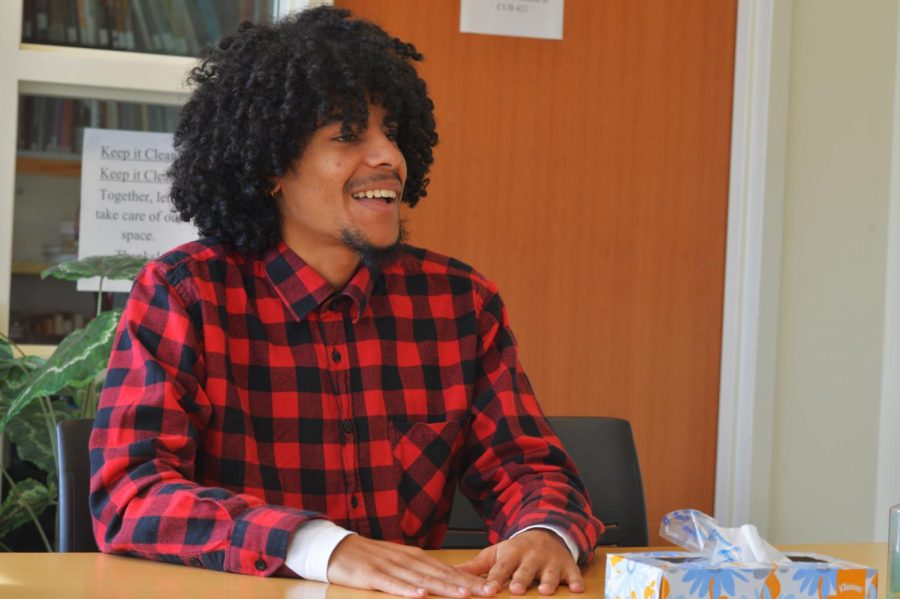Falling victim to self-victimization
Blaming others for one’s problems while also doing nothing to advance is hypocritical, dangerous
DAVID PEDRAZA | THE DAILY EVERGREEN
Senior anthopology major Nalik Dreher says that victimization of groups is a product of social conditioning Monday in the CUB.
September 20, 2018
Economic inequality, workplace discrimination and various cases of institutional racism are said to be among the worst problems facing American minorities today. However, there is one problem we often refuse to talk about that must be addressed.
It’s called self-victimization, and it’s ironically encouraged by many people who claim to promote empowerment.
This is most commonly known as the victim mindset. Those with this type of mentality tend to identify themselves as a victim of the negative actions of others. It is a trait found in many people, including those who aren’t necessarily a member of a minority.
Conservatives may fall into this mindset by blaming their situation on a large federal government. Progressives might blame certain problems on a lack of government funding. Unfortunately, habits like these are becoming common among minorities today.
Taleeb Starkes, an African-American writer and film producer, agreed in a YouTube lecture.
“Many black churches preach this victimology,” Starkes said. “Many black parents pass it on to their children, inner-city schools teach it to their students and the black media reinforces it.”
But what’s the problem with saying you’re a victim if you truly believe you are one?
It isn’t harmful to acknowledge the fact that bad things do happen and it’s completely natural to feel sorry for yourself, according to London counseling clinic Harley Therapy. However, you should keep your paradigm in check.
“If you have a victim mentality, you will see your entire life through a perspective that things constantly happen ‘to’ you, by believing you have no power, you don’t have to take action,” according to a Harley Therapy article.
This is in no way discouraging those who want to advocate for social equality — quite the contrary. If you truly feel a community is being oppressed, there is no excuse for not taking initiative and holding yourself accountable.
You shouldn’t let victimology take charge if you truly seek change in your mission towards equality,” said Malik Dreher, senior mentor for WSU’s African American Student Center.
“I’m not a victim,” Dreher said. “I’m a normal person with the same resources as anyone else. When something comes your way, you need to think, ‘Why should I stand for this?’ ”
The first steps to moving toward empowerment are education, resources and encouraging others to stand up by giving them ground to stand on, Dreher said.
Donna Arnold, retention counselor at the African American Student Center, agreed.
“It’s knowledge and being educated about your past, present and future,” she said.
Both leaders shared the idea that a mission of spreading education and resources to our minorities could stop the spread of those who make ‘victim’ their identity. Truly motivated advocates will not encourage that mindset, as that would be counterproductive to social change.
Unfortunately, due to self-victimization, many members of minority groups still don’t see the point of holding themselves responsible. Dodging accountability yields dramatic consequences, many of which would be foolish to blame on anyone else.
Take for instance the 70 percent single-motherhood rate among African-Americans. Someone could make the case parents run away because society tells them to do so, but that doesn’t make leaving the family any less of a conscious decision.
Former President Barack Obama was often criticized for encouraging the victim mindset. However, he knew people shouldn’t try to hide who is truly at fault. He made it clear that many problems would be fixed inside the black community with a better sense of accountability.
“They have abandoned their responsibilities, acting like boys instead of men,” Obama said in his 2008 Father’s Day remarks. “We know the statistics — that children who grow up without a father are five times more likely to live in poverty and commit crime, nine times more likely to drop out of schools and 20 times more likely to end up in prison.”
A simple perspective of the world may seem insignificant at first, but like a pebble being thrown in the water, it has the potential to create countless ripples. Anyone with a goal must first fight the silent battle before producing real change. That battle is the acceptance and commitment of personal responsibility.
If you want to see more empowered advocates, I’m on your side. However, if you are encouraging minorities to just see themselves as victims, you’ve lost my support completely.
An empowered individual will believe they are stronger than the adversities they face. They would refuse to see themselves as a victim in order to stay proactive in their goals of self-improvement and creating social change.
As clinical psychiatrist Jordan Peterson would say, “Stand up straight with your shoulders back and set your house in perfect order before you criticize the world.”





















